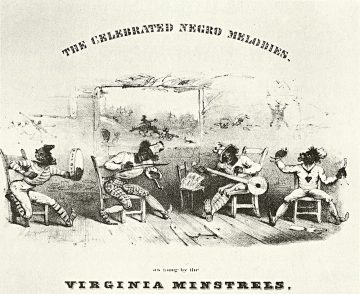John Szwed in Delancey Place:
 Minstrel shows, most often with white entertainers performing in blackface, were a highly racist phenomenon that were a pervasive form of entertainment in America for over 80 years through the 1800s and early 1900s. Yet as complicated and fundamentally offensive as they were, it was part of what led to a break with a purely European music tradition: “African Americans were leading the way in breaking with European musical tradition, and, strange as it might seem, this break had been anticipated, and maybe even urged, by the minstrel show, the first form of musical theater to reach the whole country. Its history is much longer than the eighty or so years that it is said to have lasted in the United States; its legacy is far more complicated than just a matter of white people copying black people, and even today questions about the sources of this music and its influence remain unsettled.
Minstrel shows, most often with white entertainers performing in blackface, were a highly racist phenomenon that were a pervasive form of entertainment in America for over 80 years through the 1800s and early 1900s. Yet as complicated and fundamentally offensive as they were, it was part of what led to a break with a purely European music tradition: “African Americans were leading the way in breaking with European musical tradition, and, strange as it might seem, this break had been anticipated, and maybe even urged, by the minstrel show, the first form of musical theater to reach the whole country. Its history is much longer than the eighty or so years that it is said to have lasted in the United States; its legacy is far more complicated than just a matter of white people copying black people, and even today questions about the sources of this music and its influence remain unsettled.
“Some minstrels were black, and some of those we now consider white performers were then categorized as nonwhite in one way or another. A few of the white performers who wore blackface, such as Al Jolson or Libby Holman, were very popular among people of color. Minstrelsy reached a much wider audience than just the United States, and it took on different meanings in other countries. In South Africa minstrel performances in blackface have been popular for over a century among nonwhite Africans in Cape Town during Coon Carnival in January of each year. Adolf Hitler’s mistress Eva Braun posed in blackface for professional entertainers’ photos in imitation of her favorite performer, Al Jolson, who was Jewish. Billie Holiday, like many other black performers of her time, at least once had to darken her skin so as not to look too white when appearing with a band of black musicians before a white audience.
More here. (Note: Throughout February, at least one post will honor The Black History Month. This year’s theme is “African Americans and the Vote.” Readers are encouraged to send in their suggestions)
